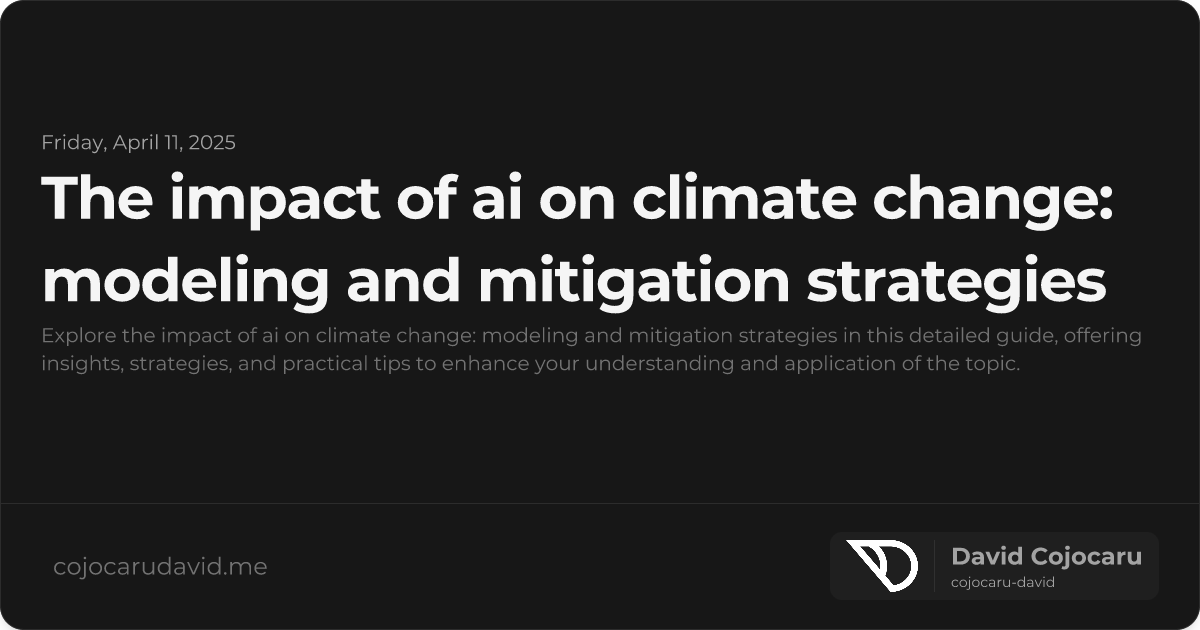AI and Climate Change: Modeling a Sustainable Future
Climate change is a defining challenge of our time, demanding innovative solutions. Artificial intelligence (AI) is emerging as a powerful ally, offering tools to understand, predict, and mitigate its effects. This post explores how AI is revolutionizing climate science, optimizing resource use, and informing smarter environmental policies, paving the way for a more sustainable future.
AI: Enhancing Climate Modeling for Accurate Predictions
Accurate climate modeling is crucial for predicting future environmental changes and informing effective action. AI significantly enhances these models by processing vast datasets with unprecedented speed and precision. Machine learning algorithms analyze data from satellites, weather stations, and ocean sensors, identifying intricate patterns often missed by traditional methods. This leads to more reliable predictions and a deeper understanding of climate dynamics.
Key Applications of AI in Climate Modeling:
- Advanced Weather Forecasting: AI-powered models, particularly neural networks, improve both short-term and long-term weather predictions, enabling better preparedness for extreme events.
- Real-Time Carbon Emission Tracking: AI systems monitor greenhouse gas emissions with greater accuracy and in real-time, helping to identify sources and track progress toward reduction targets.
- Enhanced Extreme Event Prediction: Deep learning algorithms forecast hurricanes, droughts, heatwaves, and other extreme weather events with improved accuracy, allowing for timely interventions and minimizing their impact.
AI-Driven Mitigation Strategies: Reducing Our Carbon Footprint
Beyond modeling, AI plays a vital role in developing and implementing strategies to reduce our carbon footprint. By optimizing energy consumption, improving resource management, and promoting sustainable practices across various sectors, AI is helping industries and governments achieve significant reductions in greenhouse gas emissions.
AI in Renewable Energy Optimization:
- Smart Grids for Efficient Energy Distribution: AI algorithms balance energy supply and demand in real-time, facilitating the seamless integration of renewable energy sources like wind and solar power into the grid.
- Energy-Efficient Buildings Through Intelligent Automation: Machine learning optimizes heating, cooling, ventilation, and lighting systems in buildings, creating smart cities that minimize energy waste and promote sustainability.
- Precision Agriculture for Sustainable Food Production: AI reduces water and fertilizer usage while maximizing crop yields, minimizing the environmental impact of agriculture and contributing to food security.
Challenges and Ethical Considerations: Addressing AI’s Impact
While AI offers immense potential for climate action, its deployment also presents challenges. The high computational costs, potential data biases, and energy-intensive training of large AI models raise legitimate concerns about AI’s own environmental impact. Addressing these challenges is crucial for ensuring that AI contributes to a truly sustainable future.
Addressing AI’s Environmental Impact:
- Developing Green AI: Focusing on creating energy-efficient algorithms, hardware, and data centers to minimize the carbon footprint of AI development and deployment.
- Ensuring Transparent Data Practices: Prioritizing the use of unbiased and representative climate datasets to avoid perpetuating inequalities and ensuring fair and accurate results.
- Establishing Policy Frameworks: Developing clear guidelines and regulations for AI use in climate action, aligning its development and deployment with broader sustainability goals.
The Future of AI in Climate Action: Collaboration and Innovation
The integration of AI into climate science and policy is a rapidly evolving field. Emerging innovations like federated learning (decentralized AI training) and quantum computing hold the potential to further enhance climate modeling capabilities while simultaneously reducing energy consumption. Collaboration between researchers, policymakers, and tech companies is essential for maximizing the benefits of AI in the fight against climate change.
“AI isn’t just a tool for predicting climate change; it’s a catalyst for engineering a sustainable future.”
By embracing AI responsibly and fostering collaboration, we can accelerate the transition to a sustainable future, mitigating the impacts of climate change and building a more resilient world for generations to come.

